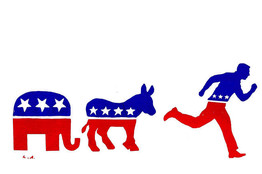
Inside the Cold, Calculating Libertarian Mind. In tests, libertarians displayed less emotion, empathy and disgust than conservatives or liberals.
from The Wall Street Journal,
9/28/12:
An individual's personality shapes his or her political ideology at least as much as circumstances, background and influences. That is the gist of a recent strand of psychological research identified especially with the work of Jonathan Haidt in his recent book "The Righteous Mind".
For example, the study reveals the following traits by ideological group:
Libertarians:
• Libertarians are people who often call themselves economically conservative but socially liberal.
• They like free societies as well as free markets, and they want the government to get out of the bedroom as well as the boardroom.
• They are somebody who is keen on military spending and religion
• And, they don't see why to get a tolerant and compassionate society they have to vote for a large and intrusive state.
• Libertarians strongly value liberty, especially the "negative liberty" of freedom from interference by others.
• Libertarians are also individualistic, stressing the right and the need for people to stand on their own two feet, rather than the duty of others, or government, to care for people.
• Perhaps more intriguingly, when libertarians react to moral dilemmas, they display less emotion, less empathy and less disgust than either conservatives or liberals. They appeared to use "cold" calculation to reach utilitarian conclusions.
• The researchers found that libertarians had the most "masculine" psychological profile.
• All Americans value liberty, but libertarians seem to value it more. For libertarians, liberty is an end in itself, trumping all other moral values.
Liberals:
• Liberals are more empathic, open to new experiences and strong tastes for compassion and fairness.
• Liberals had the most "feminine" psychological profile.
• For liberals, liberty is a way to extend rights to groups perceived to be oppressed.
Conservatives:
• Conservatives are motivated by morality just as liberals are, but, also by a larger set of moral "tastes" — loyalty, authority and sanctity, in addition to the liberal tastes for compassion and fairness.
• The baffling (to liberals) fact that a large minority of working-class white people vote for conservative candidates is explained by psychological dispositions that override their narrow economic interests.
• Studies show that conservatives are more conscientious and sensitive to disgust, but less tolerant of change.
• For social conservatives, liberty is often a means to the end of rolling back the welfare state.
Read More: The Righteous Mind






















